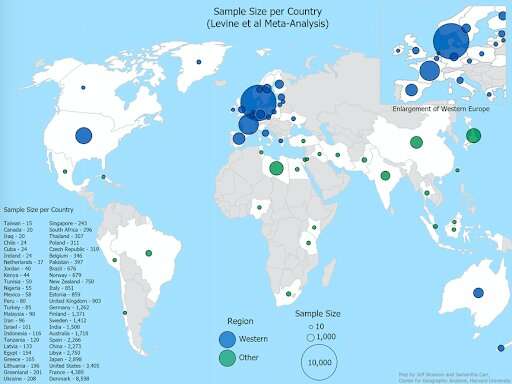
A new study from the Harvard GenderSci Lab in the journal Human Fertility, “The Future of Sperm: A Biovariability Framework for Understanding Global Sperm Count Trends” questions the panic over apparent trends of declining human sperm count.
Recent studies have claimed that sperm counts among men globally, and especially from “Western” countries, are in decline, leading to apocalyptic claims about the possible extinction of the human species.
But the Harvard paper, by Marion Boulicault, Sarah S. Richardson, and colleagues, reanalyzes claims of precipitous human sperm declines, re-evaluating evidence presented in the widely-cited 2017 meta-analysis by Hagai Levine, Shanna Swan, and colleagues.
Richardson: “The extraordinary biological claims of the meta-analysis of sperm count trends and the public attention it continues to garner raised questions for the GenderSci Lab, which specializes in analyzing bias and hype in the sciences of sex, gender, and reproduction and in the intersectional study of race, gender, and science.”
Boulicault et al. propose an alternative explanation of sperm count trends in human populations: That sperm count varies within a wide range, much of which can be considered non-pathological and species-typical, and that above a critical threshold, more is not necessarily an indicator of better health or higher probability of fertility relative to less. The authors term this the Sperm Count Biovariability hypothesis.
The paper argues that a biovariability framework better supports critically important research on factors affecting the reproductive health of all men. Lead author Boulicault: “By proposing an alternative approach to sperm count data, we aim to contribute to the burgeoning discussion among reproductive health scientists and other researchers and clinicians about men’s health.”
Among the reasons to consider alternative interpretations of sperm count patterns than that of precipitous and fertility-threatening declines in men’s sperm counts is the life of such theories in Alt-Right, white supremacist, and men’s rights discourse. These groups have used Levine and Swan’s research to argue that the fertility and health of men in whiter nations are in imminent danger, often linking the danger to the perceived increase in ethnic and racial diversity and to the influence of feminist and anti-racist social movements.
The Harvard researchers argue that claims of recent and impending dramatic declines in human sperm counts are based on a number of scientifically and ethically problematic assumptions:
- Claims about precipitous sperm decline assume that sperm counts in Anglophone developed nations of the 1970s constitute the species optimum.
- Declining sperm counts do not predict declining fertility. The assumption that male fertility scales proportionately with sperm count is unsupported by any available evidence.
- The proposed causal mechanism for lower sperm counts of exposure to environmental endocrine disrupting chemicals is not supported by the geographical and historical patterns of average population sperm counts.
- The use of two categories labeled “Western” and “Other” in analyzing sperm counts, as seen in the major 2017 meta-analysis of sperm decline studies, is scientifically unsound and embeds unethical racist and colonial assumptions in the study design. These statistical aggregations obscure the diversity across rural and urban locations within nations, and disguise the fact that there is very limited data on individuals’ sperm counts in countries Levine et al. categorized as “Other.”
Source: Read Full Article






